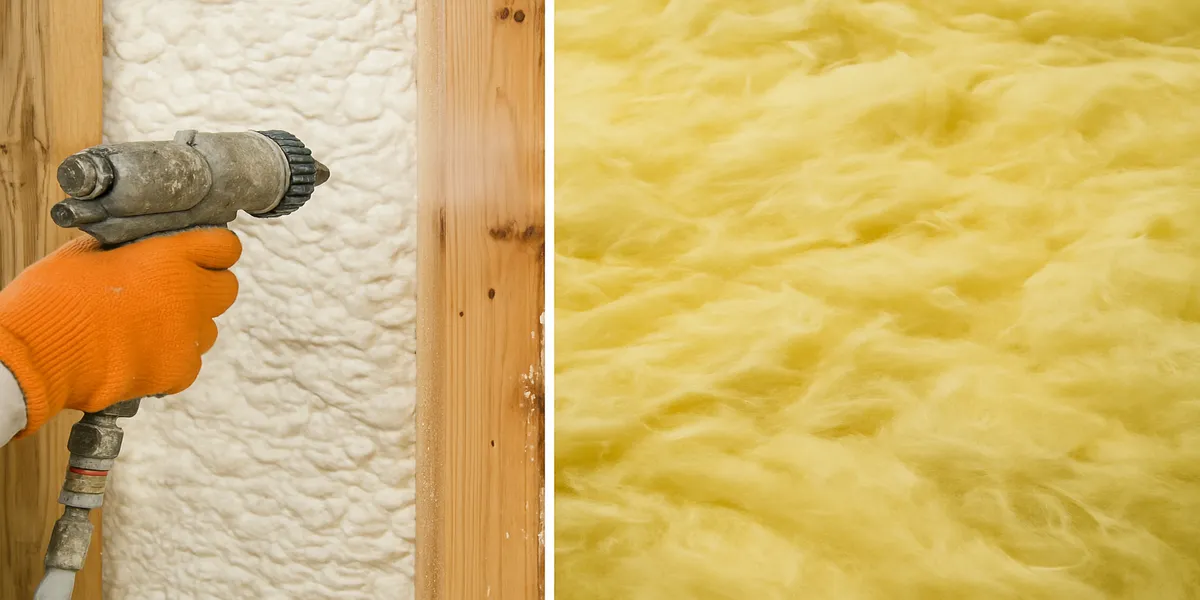Insulation is a critical component of any home, especially in a climate like Northern Virginia, where summers are humid and winters can be cold and damp. Among the most commonly used materials are spray foam and fiberglass insulation. Both options have their advantages and limitations, and the best choice often depends on your home's structure, your budget, and your long-term efficiency goals.
This article offers a detailed comparison of spray foam and fiberglass insulation, helping you make an informed decision as a homeowner in the DMV area.
Understanding Spray Foam Insulation
Spray foam insulation is a two-part liquid material that expands on application to create a dense, air-sealing barrier. It is available in open-cell and closed-cell varieties, each with distinct characteristics. Closed-cell spray foam, for example, offers a higher R-value and enhanced moisture resistance, making it ideal for attics, crawlspaces, and basements.
Spray foam is known for its ability to tightly seal gaps and cracks, significantly reducing air infiltration and improving a home's energy performance. Though the initial installation cost is higher compared to fiberglass, the long-term savings on energy bills can make it a cost-effective solution over time.
Understanding Fiberglass Insulation
Fiberglass insulation is a traditional material made from fine glass fibers and is commonly found in batts or rolls. It is relatively inexpensive and widely used in both new construction and retrofit applications. While fiberglass does provide thermal resistance, it does not offer an air-tight seal. Without additional vapor barriers or sealing measures, it may allow drafts or moisture intrusion.
Installation is generally straightforward, but over time fiberglass can settle or shift, potentially reducing its effectiveness. That said, for homeowners seeking a basic and affordable insulation solution, fiberglass remains a viable option.
Comparing Performance
- Thermal Efficiency: Spray foam provides a significantly higher R-value per inch compared to fiberglass. This translates into better insulation performance and reduced heating and cooling costs.
- Air Sealing: Spray foam excels at sealing air leaks, while fiberglass must be combined with other materials to achieve similar results.
- Moisture Resistance: Closed-cell spray foam resists moisture penetration, which can help prevent mold and mildew. Fiberglass, on its own, offers limited protection and can trap moisture if improperly installed.
- Durability: Spray foam can last for decades without sagging or settling. Fiberglass may deteriorate or shift over time, requiring reinstallation or repair.
- Cost: Fiberglass has a lower upfront cost, making it attractive for budget-conscious homeowners. However, spray foam can result in significant long-term savings on energy bills, often offsetting its higher installation price.
Which Option Is Better for Homes in Virginia?
For many homeowners in Northern Virginia, spray foam insulation presents a stronger long-term investment. It is particularly well-suited for older homes that suffer from drafts or inconsistent temperatures. The energy savings, air sealing capabilities, and durability make it an ideal solution for both comfort and efficiency.
Fiberglass, while less efficient, still holds value in certain scenarios—such as in new builds or in situations where budget constraints are a primary concern. However, it's important to ensure that installation is handled professionally to avoid common issues like gaps or compression.
What We Recommend at DMV Foam
At DMV Foam, we have extensive experience installing both spray foam and fiberglass insulation in homes across Fairfax, Vienna, Burke, and the greater DMV area. Based on our fieldwork and customer feedback, we generally recommend spray foam for its superior performance and long-term value.
Every home is different, and our team begins with a thorough assessment to determine the best insulation solution for your space. Our goal is to ensure maximum comfort, energy savings, and indoor air quality for every client we work with.
Schedule Your Free Consultation
If you're unsure about which type of insulation is right for your home, we're here to help. DMV Foam offers expert guidance, competitive pricing, and high-quality installation services tailored to your needs. Contact us today to schedule a free consultation and discover how better insulation can transform your home's efficiency and comfort.
Ready to Upgrade Your Home's Insulation?
Every home has unique needs, and the best insulation choice depends on your specific situation. Our experts will assess your home and provide honest recommendations tailored to your goals and budget.
Schedule Your Free Assessment